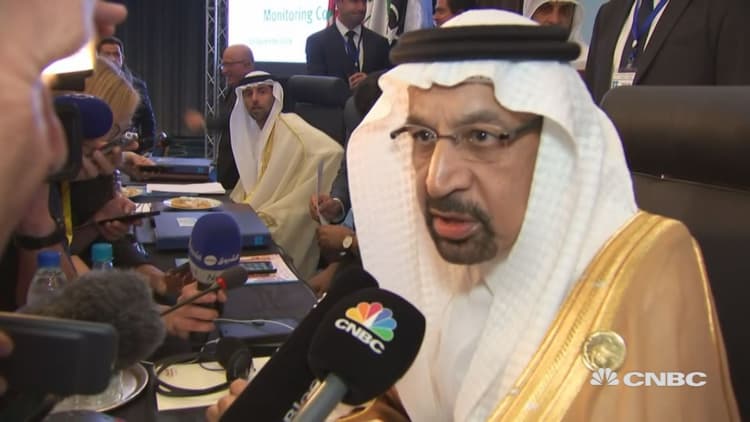President Donald Trump has repeatedly ordered OPEC to tamp down rising oil prices, but his Twitter barbs might be wasted on the world's oil cartel.
Analysts say OPEC's ability to drive down the cost of crude will be limited until it gets the opportunity to prove it can fill the gap left by falling Iranian exports. Shipments from OPEC's third largest producer are widely expected to fall by roughly 1 million barrels a day in the coming months as U.S. sanctions bite.
The upshot is that no matter what OPEC does, prices may keep bubbling up ahead of two major events: Trump's Nov. 4 deadline for oil buyers to stop importing Iranian crude and U.S. midterm elections two days later.
This week, OPEC and its allies rebuffed Trump's latest demand to hike output. The 15-nation cartel, Russia and several other producers opted instead to stick to their earlier decision to only gradually increase supply.
On Tuesday, Trump told the UN General Assembly OPEC is "ripping off the rest of the world" by pushing up prices.
Trump blames OPEC for the rally because the cartel has been limiting its output since January 2017 in order to balance the market after a punishing oil price downturn. In June, OPEC and its allies agreed to increase output by about 1 million barrels day after cutting more than they intended.
However, prices have remained elevated since then and the national average gasoline price remains stuck near $2.85 per gallon as the market braces for the impact of sanctions on Iran.
On Monday, Brent crude, the international benchmark for oil prices, hit a nearly four-year high above $81 a barrel. The rally continued on Tuesday, with Brent topping $82 for the first time since November 2014.
The main driver is inaction by the oil producer alliance at its meeting Sunday, said John Kilduff, founding partner at Again Capital. OPEC issued a statement saying the producers would continue to monitor the market and meet customer demand, but offered no new details about how they would compensate for the lost Iranian barrels.
"They're being cagey once again about what their plans are," Kilduff said. "They give these answers to questions that are sort of a Rubik's Cube of dialogue."
A Wall Street Journal report that top exporter Saudi Arabia is running low on supplies of Arab light, its most popular crude grade, is also rattling the market, analysts said. The report suggested that a shortage of certain types of oil is already developing as Iranian exports start to decline.
Saudi Energy Minister Khalid al Falih told CNBC on Sunday that markets are "quite balanced today" and "there is plenty of supply to meet any customer that needs it."

However, the market disagrees with that assessment, and traders aren't reassured by OPEC's pronouncements that it is prepared to meet demand, said Andrew Lipow, president of Lipow Oil Associates.
The market's message to OPEC is "Show me the barrels," he said.
"The market is concerned that perhaps OPEC doesn't have as much spare capacity as they've been advertising, and as a result prices are moving up because of that perception," Lipow said.
"They're concerned about sanctions on Iran taking significant amounts of oil off the market. At the same time, that Venezuelan production continues to decline and we're one violent act away from Libya taking oil off the markets."
In his view, prices could keep percolating upward until OPEC actually demonstrates it won't leave the market undersupplied. He expects oil prices to rise to about $83 a barrel, which would increase gasoline prices by about 10 cents a gallon.
Lipow's projected increase would leave many parts of the U.S. paying more than $3 a gallon heading into the midterm elections.

Even if OPEC steps up and announces another production increase, oil bulls could push prices higher, said Tamar Essner, director of energy and utilities at Nasdaq Corporate Solutions. That's because hiking output would reduce the amount of spare capacity available to tackle an unexpected drop in supply.
"The market has a tendency to view that as quite bullish for prices because you look at the supply risks around the world and realize there's no insurance policy or buffer zone," she said.
OPEC's willingness to hike output also remains in question.
While the Saudis are concerned that high prices will shrink demand for oil, rising crude costs allow them to throttle back unpopular austerity measures that helped them weather the downturn, according to Essner. As the de facto leader of OPEC, Saudi Arabia must also be careful to maintain its independence, even as Saudi leaders work with Trump to isolate Iran, the kingdom's chief regional rival.
"The Saudis are walking a very fine line of petro-diplomacy," Essner said.
"Politically, they can't afford to be seen as working for Trump, so it is a tough situation for them."


